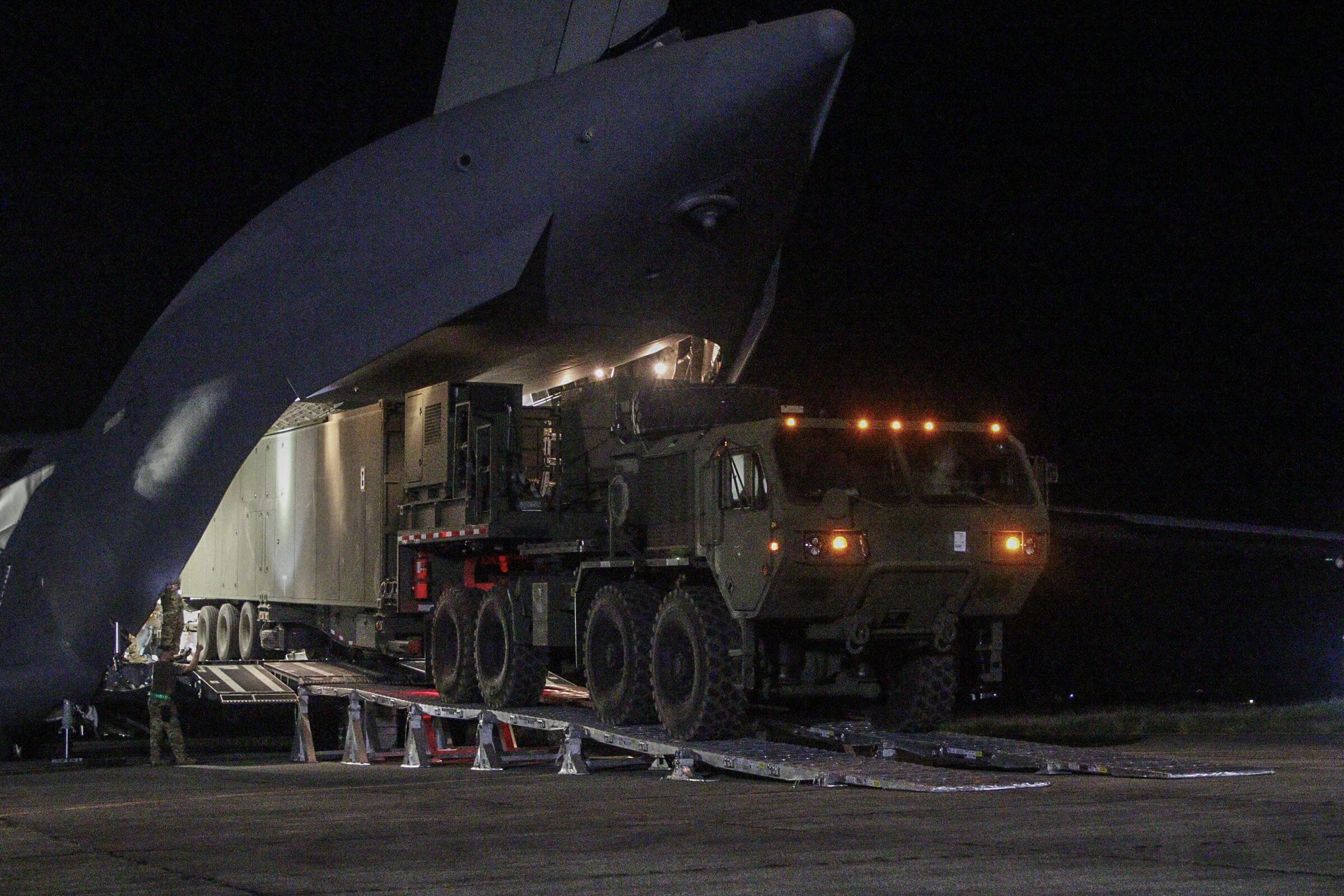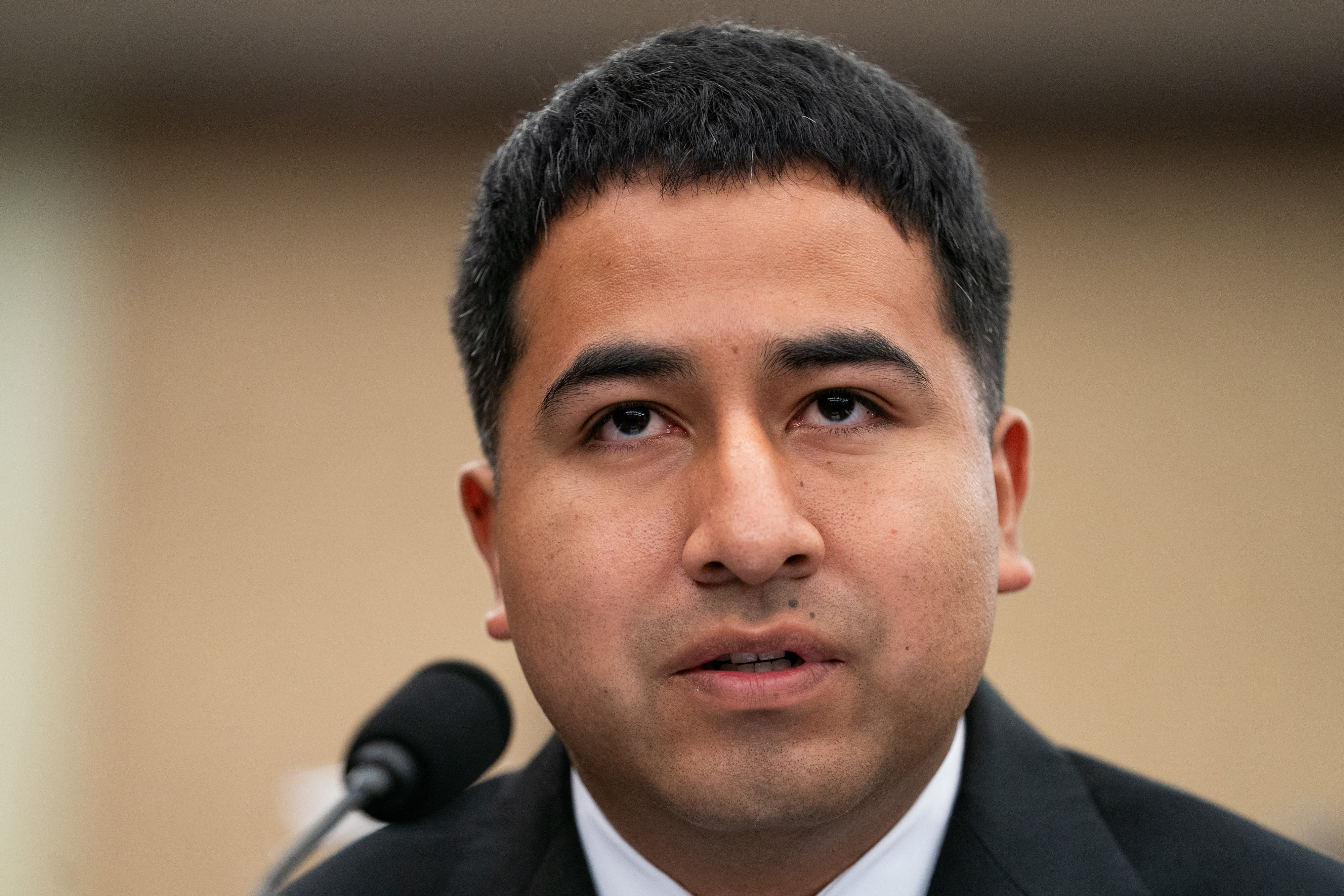source GAIA package: Sx_MilitaryTimes_M6201110106080332_5675.zip Origin key: Sx_MilitaryTimes_M6201110106080332 imported at Fri Jan 8 18:18:04 2016
More on Workman
When Sgt. Maj. Carlton Kent hits the road to visit Marines, he likes to share the story of one man's fight with post-traumatic stress disorder.
Details vary slightly each time the top enlisted Marine tells it, but the important pieces are always the same. Kent talks about a hard-charging squad leader who went through hell more than six years ago in Iraq, and how his life and career fell apart soon after he came home.
Kent, who retires Thursday, never mentions the Marine's name, but Jeremiah Workman's combat exploits are legendary. Awarded the Navy Cross for coordinating the rescue of fellow Marines trapped inside a Fallujah house Dec. 23, 2004, Workman fought his way through machine-gun fire and grenade blasts three times during a battle that left three Marines and at least 24 insurgents dead.
Less known is the bond the two men have formed and the fatherly role Kent played in helping Workman put the pieces back together after he'd melted down while serving as a drill instructor and later separated from his wife. Kent grew close with Workman after taking him on his staff at the Pentagon, and tells his story to underscore for Marines the importance of looking out for one another.
Workman, now medically retired and working for the Department of Veterans Affairs, credits Kent with showing him there was hope.
"Where I'm at today, it's because of him," said Workman, 28. "Yeah, I've had some great doctors and counseling along the way, but I worked my ass off for him because it was an I-never-want-to-let-my-father-down kind of relationship."
Battle scars
Workman's downward spiral began in the charred ruins of Fallujah, as his squad searched for insurgents and weapons caches during the closing days of Operation Phantom Fury. His 81mm mortar platoon with 3rd Battalion, 5th Marines, out of Camp Pendleton, Calif., had shelled targets from the northern outskirts of the city in November, but was called on to search houses the following month to ensure the city was safe for civilians to return.
The firefight began when insurgents ambushed another 3/5 squad led by Sgt. Jarrett Kraft, pinning down at least three Marines inside on the second floor.
Dreading the worst, Workman organized his squad to enter the building. A corporal at the time, he and his Marines faced a maelstrom of small-arms fire and grenades. Three times, he sprinted up a stairwell under fire to fight the insurgents and help the pinned down Marines, who eventually escaped through the roof. At times, the Marines were close enough to see the insurgents' faces amid the smoke and flashes of gunfire.
Two Marines — Cpl. Raleigh Smith and Lance Cpl. James Phillips, both 21 — were mortally wounded in the house, while several others were hurt but survived. Lance Cpl. Eric Hillenburg, 21, was killed nearby, cut down by enemy sniper fire as he and his fire team raced to the house to help. Workman sustained multiple shrapnel wounds from grenade explosions, but escaped without being seriously hurt.
The rest of the day brought other heartaches. He and Kraft, who also earned a Navy Cross for his actions that day, cleaned a "gelatinous mess" of blood and brain matter from the back of the Humvee that carried casualties back to Camp Fallujah, Workman wrote in his 2009 autobiography, "Shadow of the Sword." He called his wife, Jessica, seeking support, but she coldly hung up on him.
"Well, you signed the enlistment papers," she said, according to the book. "You deal with it."
PTSD diagnosis
Workman has carried the emotional and physical scars of that day with him ever since.
He toughed out the rest of his deployment and was promoted to sergeant while still in Iraq, but he began drinking regularly after 3/5 returned home to Camp Pendleton, in 2005, running up a $3,000 bar tab in a single month, he said in his book. He was wracked by nightmares, including a recurring dream in which he was unarmed and chased by insurgents in a stairwell.
By the time Workman was reassigned to Parris Island, S.C., and became a drill instructor, he was a complete mess. He lost it in the spring of 2006. Having suffered flashbacks in front of recruits, he was relieved from DI duty, diagnosed with PTSD and assigned to janitorial jobs around the depot.
On May 12, 2006, Workman was awarded the Navy Cross at Parris Island. He didn't feel like he deserved the award, and had flashbacks during the ceremony, he said in his book.
A month later, he nearly committed suicide in his hometown of Richwood, Ohio. His family found him in the garage with the barrel of a .22-caliber rifle in his mouth and a bottle of ibuprofen in his stomach. They took the rifle from him, and his wife forced him to vomit up the pills, the book said.
Workman was transferred to Headquarters and Service Battalion at Marine Corps Base Quantico, Va., that September, which gave him better access to medical care, but no immediate job on base. By December, he was assigned to the National Museum of the Marine Corps as a docent, serving as a tour guide and ambassador for the Corps.
He initially liked parts of the job, but found it difficult to answer all the questions that visitors had about war. He eventually sought a transfer to Pendleton's I Marine Expeditionary Force, talking several times to then-Lt. Gen. James Mattis, who had taken over the command with Kent as his sergeant major.
"The first time he called me, I was at my house at Quantico," Workman said of Mattis. "It was one of those things you don't really forget, when General Mattis calls you. The crazy thing is when I answered the phone, I thought it was one of my buddies from 3/5 playing a prank on me.
"He was like, 'Is Sergeant Workman there? It's General Mattis.' And I was like, 'Who the hell is this?' He was like, 'It's Jim Mattis.' And I said, 'Oh, sh--.'"
A lifeline
Workman declined to say what he and Mattis talked about during their phone conversation, but estimates it lasted about 30 minutes. Afterward, Mattis began working to bring Workman to I MEF, but the process stalled in spring 2007.
The general appealed to Kent, who had just left I MEF for the Pentagon to become the Corps' top enlisted Marine, Workman said.
Kent and Workman had met before. After the bloody fight in the house, Kent spoke to him and his fellow Marines at Camp Fallujah. Wounded, dirty and beaten down, the Marines choked up as Kent told them to honor the sacrifice of their fallen brothers, Workman said in his book.
"I know it's tough right now. I know you're hurting," Kent said that day, according to Workman's book. "We all are. But I want you to keep your heads up. We're in a fight with a determined, fanatical enemy, and I'm going to need each of you in the weeks to come."
More than two years later, Kent and Workman discussed the troubled Marine's options during a meeting at Quantico, Workman said. Orders were cut to bring Workman on his staff, effective June 12, 2007.
In speeches, Kent expresses frustration that Workman's command at the time was not aware of all his personal struggles.
"I called his battalion sergeant major, and his first thing to me was, 'Hey, Sergeant Major Kent, that sergeant ain't nothing but a problem.'" Kent told a group of Marines in March during a trip to Rota, Spain. "I got kind of pissed. I said, 'Stop. He's not your problem no more. He's our problem.' And I said, 'Have him report to the Pentagon.'" Those first days on Kent's staff weren't easy. With Workman's outbursts continuing, Jessica had left him and taken their new baby boy, Devon, with her. Workman credits Kent and his wife, Liz, with helping them through the separation, and with listening to their problems. Kent's staff also played a role, prodding Workman to exercise with them and stay active.
"Whenever Jess or I were having issues, or I was just having a bad day in general, Sergeant Major Kent would talk to me like [he was] my dad." Workman said. "He would sit me down, and it wasn't like he was the hard-ass Marine gunny who says, 'Suck it up.' He actually took an interest, and actually cared about what was going on. He helped me through a lot of situations."
From June 2007 to August 2008, Workman filled several roles on Kent's staff, including driver and personal security detail. He traveled with Kent to Iraq in 2008, visiting Marines in parts of Fallujah that were stricken with violence in 2004. Workman was nervous about the trip — his first to Iraq since 2004 — but it helped his healing process when he saw the improvements made in Iraq, he said.
"Every night, we would talk about all the positive things that had changed there," Workman said, recalling a visit to a section of eastern Fallujah where snipers shot several Marines in 2004. "It was really weird to just be standing out there, but the place was just completely different."
Moving forward
Workman and his wife got back together and now own a house in Spotsylvania County, Va., just south of Quantico. Devon is 4. His baby sister, Delaney, was born last year.
Workman left the Corps as a staff sergeant in January 2010 after serving about 16 months at Quantico with the Wounded Warrior Regiment. He stayed on as a civilian, connecting troubled, wounded and sick veterans with needed services.
Earlier this year, Workman moved on to the VA, where he will serve as a military service coordinator, working with service members in Northern Virginia who are medically retired. It's a new challenge, and it has come with new stresses as he goes through job training in Baltimore.
Still, he said he has started to turn the corner on some longtime struggles. One example: For years, he went into a shell when Christmas and the anniversary of the house battle neared. He still has ups and downs each December, but made a renewed effort this year to stay involved with his family, he said.
"I'm still on the medication and all that stuff," he said. "Now that my kids are getting a little older and my son is getting into Christmas and understands about Santa Claus and all that, for the sake of my kid I had to make a conscious effort to not be doing that crap."
Kent and Workman also stay in touch regularly, both men said. Workman has urged Kent to tell his story with the hope that it can help other Marines.
"I tell that story about him because I want another Marine to hear it, and then another Marine to hear it, and they pass that leadership on," Kent said. "Warriors today, they're seeing the horrors of combat. And those are the same Marines that we need to stick around the Marine Corps. That's our combat experience."
The two Marines still talk on the phone frequently, and see each other about once a month, Workman said. Little of their personal relationship was described in "Shadow of the Sword" because it was written mostly before he joined Kent's staff, but Workman also wanted to be respectful of Kent's position and office, he said. He's planning to attend Kent's retirement ceremony at Marine Barracks Washington.
"The man is like my father," Workman said. "He's a great man and a great leader, and he never forgot where he came from. I tell people, 'If you're a good person — if you're a good man or woman first — you will be a good Marine.' And that's him."





